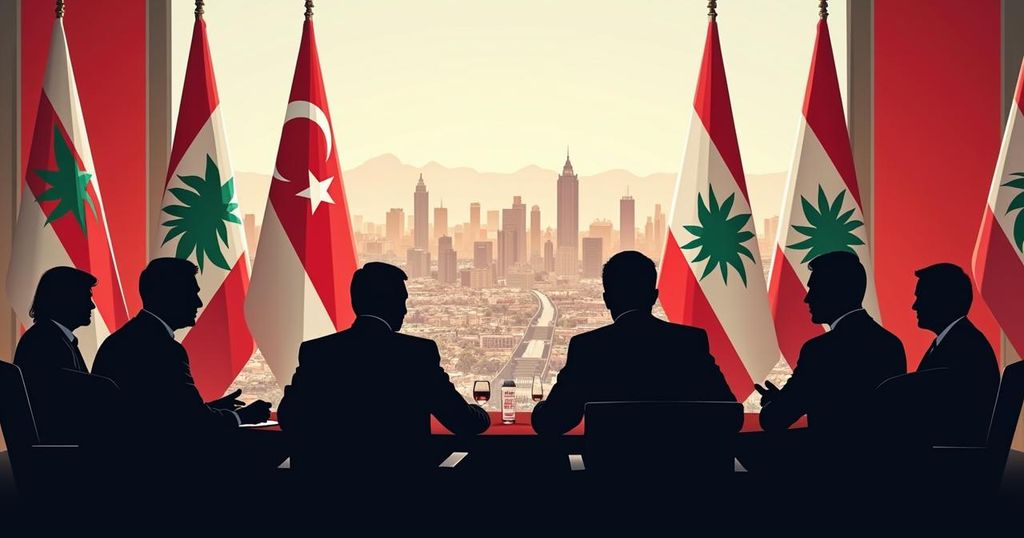Iranian Foreign Minister’s Visit to Beirut Amidst Escalating Regional Tensions and Gulf Neutrality

Iran’s Foreign Minister Abbas Araghchi visited Beirut following intense military action between Iran and Israel. His arrival coincided with notable talks in Doha regarding potential reconciliation between Iranian and Gulf leaders. As tensions mount, the humanitarian impact on Lebanon continues to escalate, prompting concerns over a prolonged conflict.
On Friday, Iranian Foreign Minister Abbas Araghchi arrived in Beirut amidst escalating tensions in the region, particularly following Iran’s recent missile strikes on Israel. This visit occurred shortly after Israeli air strikes near Beirut’s airport and an attack that targeted Hashem Safieddine, the potential successor of Hezbollah’s leader, Hassan Nasrallah, who died in an Israeli operation on September 27. During his stay, Araghchi is set to confer with Lebanese officials, including Caretaker Prime Minister Najib Mikati and Parliament Speaker Nabih Berri, an ally of Hezbollah. Simultaneously, a summit in Doha gathered Iranian and Gulf leaders, signaling a possible thaw in relations between Saudi Arabia and Iran. Iranian media reported President Masoud Pezeshkian expressing Iran’s interest in strengthening ties with Riyadh. Pezeshkian stated, “We consider Islamic countries, including Saudi Arabia, as our brothers,” emphasizing a cooperative future. The Saudi Foreign Minister, Faisal bin Farhan, echoed sentiments aimed at mending relations, asserting that Riyadh seeks to resolve issues and offer support in maintaining regional peace. The Gulf Cooperation Council members have expressed their neutrality concerning the ongoing Iran-Israel strife. This is critical for Saudi Arabia, which remains cautious due to past attacks on its oil infrastructure. Following recent conflicts, including Iran’s largest-scale retaliatory strike against Israel, tensions have heightened, prompting Israeli officials to call for robust countermeasures against Iranian assets. Amidst these developments, Iranian Supreme Leader Ali Khamenei justified Iran’s military actions as a legitimate defense against aggression. He portrayed the Iranian presence in regional conflicts as part of a unified front against oppression, stating, “Our enemy is one.” The devastation in southern Lebanon has escalated, with casualty figures reaching alarming numbers, impacting both military personnel and civilians. The ongoing influx of displaced individuals into shelters has stretched resources thin, leaving many in dire conditions. Iran and Israel remain locked in a dangerous cycle of retaliation, with regional implications perceptibly escalating.
In light of recent missile attacks launched by Iran on Israel, the geopolitical landscape in the Middle East has become increasingly fraught. Araghchi’s visit to Beirut comes during a period marked by Israeli air strikes that threaten the stability of Lebanon and the broader region. The historical animosity between Iran and Israel, coupled with the complex dynamics of Hezbollah’s involvement, provides critical context to these events. Additionally, the notion of rapprochement between Iran and Saudi Arabia exemplifies the shifting alliances and regional politics that characterize contemporary Middle Eastern relations, particularly in response to perceived threats from Israel.
In summary, the visit of Iranian Foreign Minister Abbas Araghchi to Beirut is set against a backdrop of rising hostilities between Iran and Israel, particularly following Iran’s recent missile strikes. The simultaneous diplomatic efforts in Doha highlight a notable attempt to bridge differences between Iran and key Gulf states, emphasizing the need for dialogue amidst conflict. Nevertheless, the human cost of this regional turmoil is significant, with increasing casualties resulting from the ongoing violence in Lebanon, further complicating the situation and necessitating urgent humanitarian responses.
Original Source: www.middleeasteye.net








